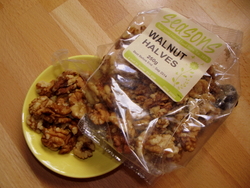
A large study undertaken at Harvard Medical School seems to show that people who include significant quantities of nuts in their diets, can reduce their mortality risk: those who ate nuts seven or more times per week, reduced their risk of dying by around 20%. The researchers followed 76000 women and 42000 men for between 24 and 30 years, during which time the subjects kept records of their consumption of nuts. On analysis, both nuts and peanuts were found to reduce the chance of dying from cardiovascular disease, cancer, diabetes, infectious diseases, lung and kidney diseases.
Parallels have been found in other research from Iowa, the UK and Holland. The researchers speculate that nutrients in nuts, such as unsaturated fatty acids, high-quality protein, fibre, vitamins (folate, niacin, vitamin E), minerals (potassium, calcium, and magnesium), and plant chemicals (carotenoids, flavonoids, and phytosterols), may confer cardioprotective, anti-cancer, anti-inflammatory, and antioxidant properties.
(Association of nut consumption with total and cause-specific mortality. New England Journal of Medicine, 21 November 2013.)
Meanwhile, research at Loma Linda University in California, suggests that walnuts may have the ability to prevent “bad” cholesterol (LDL) from oxidising and damaging our blood vessels. The researchers wanted to build on previous work which has shown associations between high nut consumption and lower rates of cardiovascular disease and obesity. Although this is normally attributed to the presence in nuts of unsaturated fatty acids, they were interested in whether other constituents are preventing oxidative damage to the body. Sixteen healthy volunteers were given a breakfast of either 90g walnuts with water, or a breakfast similar in macronutrients made from olive oil, white bread, dried egg powder and water. Blood analysis would appear to indicate an antioxidant effect aswell as reduced inflammatory responses in individuals when consuming the walnut meal.
(Effect of a walnut meal on postprandial oxidative stress and antioxidants in healthy individuals. Nutrition Journal, Volume 13, 2014.)
